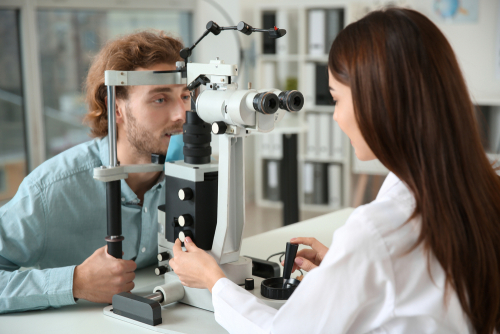
Annual Eye Exams: Eye exams are essential, even if you have perfect vision. Eye exams can catch conditions like glaucoma, diabetic retinopathy, and AMD in their early stages. Avant Eyes recommends annual eye examinations with retinal photography to detect early stage disease.
Screen Time Management: Excessive screen time can lead to digital eye strain, a condition that causes dryness, blurry vision, and headaches. Try the 20-20-20 rule: every 20 minutes, look at something 20 feet away for at least 20 seconds to give your eyes a break.
Protective Eyewear: UV rays from the sun can damage your eyes over time, so wearing sunglasses with UV protection is crucial. Additionally, protective eyewear is necessary when engaging in activities with potential eye hazards, such as sports or construction work.
Fun Fact: Not all sunglasses are made equally! Certified UVA and UVB protecting lenses are the most effective. Ask us at your next exam! (please use our green color that is used throughout the website for this text)
Good Nutrition: Nutrients like vitamins A, C, E, and zinc are important for eye health. Leafy greens, sweet potatoes, and fish high in omega-3 fatty acids can help keep your eyes functioning well.
Fun fact: Carrots do not prevent blindness or improve your vision!
Avoid Smoking: Smoking increases the risk of cataracts, AMD, and other eye diseases. Quitting smoking, or never starting, can help protect your vision over the long term.
Practice Proper Contact Lens Hygiene: If you wear contacts, always follow recommended cleaning routines, avoid sleeping in lenses unless prescribed, and replace them as directed to prevent infections.
Stay Hydrated: Keeping your body hydrated helps maintain healthy tear production, which is essential for lubricating and protecting the eyes.
Manage Chronic Conditions: Conditions like diabetes and hypertension can affect eye health. By managing these conditions, you’re taking steps to protect your vision as well.
When to Seek Medical Attention
If you experience any sudden vision changes, such as flashes of light, floaters, double vision, or severe eye pain, consult an eye care professional immediately. Early intervention can make a significant difference in treating many eye conditions.
Fun Fact: Eye emergencies should be seen by an eye doctor. Urgent care facilities and emergency rooms are not fully equipped to examine the detailed, microscopic structures of your eye. We are available for emergency care.
Have you scheduled your annual eye exam? Schedule here.






